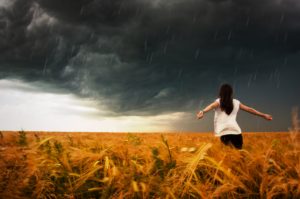We’re exploring what it means to be in the image of God. The context of Gen 1.26-27 makes it pretty clear that the image includes our dominion over the earth. But is there even more to it than that?
This is where we move from biblical theology to systematic theology: we use our minds to discover and consider ideas that the Bible might not say explicitly, but that are within biblical limits.
Being in the image of God means to resemble him. So let’s sit and think for a bit. In what ways do we resemble God, beyond the already stated resemblance of dominion?
The Bible makes it clear that God is not an influence, or a force, or all that is good in the world. He’s a person. (Well, three persons, actually, but that comes in the next post.) He thinks: he’s self-aware (Gen 15.7), and he knows all things (Isa 46.9-10), and he invites us to reason with him (Isa 1.18). Further, he chooses: he likes some things better than others (Dt 17.1), and he makes decisions to do this or that (Jn 1.13). And he feels: he has emotions, both “positive” (love [Jn 3.16], joy [Zeph 3.17]) and “negative” (anger [Rom 1.18], grief [Eph 4.30]).
God is personal. And so are we. We’re not infinite like him, of course; he’s omniscient, and we’re just sortaniscient, but we do have minds that think and reason, reflecting the way his mind works. (How do we know how his mind works? He tells us, both in the Scripture—we can analyze its logical forms—and in the created world, where we see design elements that reflect his thinking.)
We’re volitional like him as well: we too express preferences and make choices based on those preferences, and on the reasoning we’ve previously conducted. And, as you know, we’re emotional like him too. We have loves and hates, likes and dislikes; we laugh, we grieve, we respond in anger to things we find unacceptable. Like God, except imperfectly.
Perhaps like me you’ve wondered exactly how we’re different from the animals in this regard, animals not being in the image of God. In some animals at least, we think we see evidence of thinking. Our pet dogs, we are convinced, pick up on our thoughts and respond sensibly. A chimpanzee uses a straw to pull termites out of a hole so he can eat them. An orangutan solves a problem to gain access to food. A whale shark seeks a diver’s help in getting free from a net. Bees show their sisters where the pollen is.
And what about will?
Have you ever tried to give a cat a bath?
And emotions?
Dogs rejoice.
Cats hate.
It’s sometimes hard to tell whether these animal behaviors are what they seem, or whether we’re projecting onto them the thoughts and feelings we would have if we were in those situations. Maybe we’re not seeing what we imagine we see.
But it’s pretty hard to argue that there isn’t some kind of thought, or choice, or emotion going on in many of these scenarios. So are animals in the image of God too?
The Bible seems to rule that out. Of course it doesn’t say that animals bear the image, but I think this conclusion is more than just an argument from silence. The Creation account draws a sharp contrast between what has come before—the creation of the earth and of the creatures who populate its air, water, and land—and the creation of man “in our image.” These things are not the same. Whatever some animals do by way of thinking, or choosing, or feeling is qualitatively different from the faculties that God has placed in us. The orangutan may be “thinking” in some rudimentary way, but he is not thinking about the consequences of being created, or choosing to act more consistently with that status, or responding in joyous worship to his creator.
What it must have been like to be Adam or Eve, in God’s image as persons, but with unbroken minds, and wills, and emotions! with thoughts that are reliable, with wills that always choose wisely and well, and with emotions that are servants rather than masters!
Take heart. Our brokenness is not permanent. The day is coming when, by the grace of God, we shall again “be like him” (1Jn 3.2), perfected, glorified, consistent and righteous.
What a day that will be.

